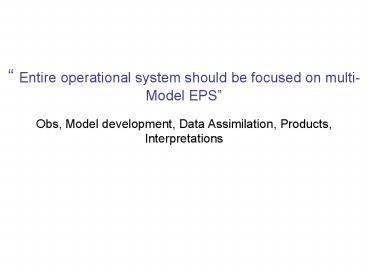Entire operational system should be focused on multi PowerPoint PPT Presentation
1 / 17
Title: Entire operational system should be focused on multi
1
Entire operational system should be focused
on multi- Model EPS Obs, Model development,
Data Assimilation, Products, Interpretations
2
Global and Regional Ensemble Prediction Systems,
and THORPEX
Ken Mylne and David Richardson
3
(No Transcript)
4
Background application of ECMWF EPS
- Met Office makes good use of ECMWF ensemble for
medium-range - Medium-range forecasts based on most-probable
outcome - Early warnings of severe weather based on EPS
probabilities - Increasing emphasis on risk management tools
- Need for short-range probabilities
- Previous research shows benefit of multi-model
ensembles
5
Global EPS
- Global Ensemble provides
- Perturbed LBCs for LAMEPS
- Global coverage for targeting and forecasts
- Contribution to TIGGE
- Now planned to run to 15 days with 20 members
- Operational collaboration with NCEP and MSC
6
Met Office Short-Range EPS Plans
- Nested Global and Regional ensembles for
short-range - Grid-lengths
- 90km Global
- 20km Regional
- Around 16 members
- Run to T72
- ETKF initial condition perturbations
- Stochastic physics
- Integrated with observation targeting
- Running for demonstration testing from August
2005
7
Medium-range Ensemble Prediction at ECMWF
- Roberto Buizza1, Martin Leutbecher1, Tim Palmer1
and Glenn Shutts1,2 - Contributions from Jean Bidlot, Graham Holt,
Martin Miller, Mark Rodwell, Adrian Simmons and
Nils Wedi to the development of VAREPS are
acknowledged. - 1 European Centre for Medium-Range Weather
Forecasts (www.ecmwf.int) - 2 Met Office (www.met-office.gov.uk)
8
The four key messages of this talk
- The ECMWF Ensemble Prediction System (EPS) has
been continuously improving. Results indicate a
2 day/decade gain in predictability for
probabilistic products. - Changes implemented on 28 September 2004 will
further improve the reliability of tropical
cyclones track prediction. - Future changes in the singular vectors are
expected to improve the accuracy of EPS
forecasts, especially in the earlier forecast
range. - The future implementation of the VAriable
Resolution EPS is expected to improve the EPS
accuracy in the early/medium-range, and will
extend the EPS forecast length to 14 days. VAREPS
will be the first step of the implementation of a
seamless EPS.
9
The EPS performance has been continuously
increasing
- These changes helped to continuously improve the
EPS accuracy. - The continuous improvement is shown, e.g., by the
time evolution of three accuracy measures,
ROCAfgtc, BSSfgtc and RPPS.
10
Over NH, Z500 EPS predictability has increased by
2d/dec
- Results indicate that considering Z500 d5 and
d7 forecasts over NH - The EPS control has improved by 1 day/decade
- The EPS ens-mean has improved by 1.5
day/decade - The EPS probabilistic products have improved by
2-3 day/decade
11
ECMWF, MSC and NCEP performance for 3 month
(JJA02)
- Recent studies 2,9 have shown that, accordingly
to many accuracy measures, the ECMWF EPS can be
considered the most accurate single-model
ensemble system. - This is shown, e.g., by the comparison of the EV
of 10-member ensembles based on the ECMWF, MSC
(Meteorological Service of Canada) and NCEP
(National Centers for Environmental Predictions)
EPSs 9 (Z500 over NH). - EV, the potential economic value, is the
reduction of the mean expenses with respect to
the reduction that can be achieved by using a
perfect forecast 4,16.
12
ECMWF, MSC and NCEP performance for 3 month
(JJA02)
- The ECMWF leading performance 9, estimated to
be equivalent to a gain of 1 day of
predictability, has been linked to - A better analysis
- A better model
- A better estimation of the PDF of forecast
states. - This latest point can be seen, e.g., by comparing
the ensemble spread and the ensemble-mean
forecast error of 10-member ensembles based on
the NCEP, MSC and ECMWF EPSs (Z500 over NH).
13
The Sep 04 change in the definition of TR-SVs
target areas
- On 28 Sep, one major change was introduced in the
EPS. In the new system - Target areas are computed considering TCs
predictions - Areas are allowed to extend north of 30ºN
- Up to 6 areas can now be targeted
- Tropical depression (WMO cl?1) detected between
40S-40N are targeted - SVs are computed using a new ortho-normalization
procedure
14
Impact of the Sep 04 change in the TR-SVs
target areas
Results based on 44 cases (from 3 Aug to 15 Sep
2004) indicate that the implemented changes in
the computation of the tropical areas has a
positive impact on the reliability diagram of
strike probability.
15
VAREPS definition, and planned implementation
schedule
- VAREPS configuration
- D0-7 TL399L40, dt1800s
- D7-14 TL255L40, dt2700s
- Rationale predictability of small scales is
lost relatively earlier in the forecast range.
Therefore, while forecasts benefit from a
resolution increase in the early forecast range,
they do not suffer so much from a resolution
reduction in the long range. - Implementation Q3-Q4 2004
16
NRL Ensemble Research Carolyn Reynolds
(reynolds_at_nrlmry.navy.mil)
New (NCAR-NRL) ensemble perturbation system based
on NAVDAS analysis error variance estimates.
Larger amplitudes in the tropics and sub-tropics
than the current operational (bred-mode) scheme.
17
NRL Ensemble Research
30N-70N
20S-20N
New method has comparable or better mean skill
than current (above). Rank histograms (right)
shows new method still under dispersive, though
better than current system. (Results for 850-mb
U April 01-10)
Preliminary results Comparable (better)
performance in the mid-latitudes (tropics).
Current and future work will consider model error
and ensemble transform (Bishop and Toth, 1999)
for both global and mesoscale.

